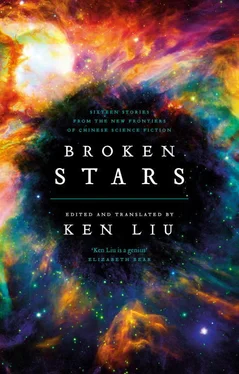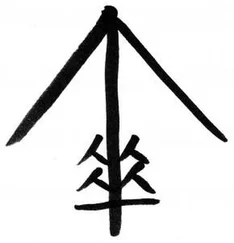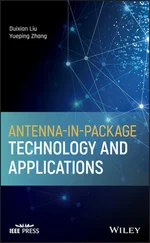“I can’t tell what I’m hearing. It doesn’t sound like the ocean.”
“Of course it doesn’t sound like the ocean. Even the Huangpu River is almost dried out. This is the drought season—there are only two seasons now, drought and flood. It’s possible to cross the river just by rolling up your pant legs. In fact, several hundred thousand starving refugees have just crossed the river into Pudong, covering the riverbed like a mass of ants. The city is in disarray; I can see fires starting everywhere.”
“What happened? Solar energy should have the lowest environmental impact.”
“You’re sadly mistaken. Do you know how many square kilometers of monocrystalline silicon fields are necessary to supply the energy needs of a city like Shanghai? At least twenty times the area of Shanghai itself! During the century after your time, urbanization accelerated, and even a mid-sized city now is comparable to the Shanghai of your era. Starting in the 2020s, silicon plows transformed the face of every continent. After all the deserts had been turned into solar fields, they began to devour arable land and vegetation cover. Now, every continent is suffering from excessive siliconization. The process had advanced far faster than desertification. The land surface of the Earth is now almost entirely covered by silicon solar fields.”
“But this should be impossible under theories of economics! As land grows more scarce, the value of any unplowed land ought to rise, and silicon plows should become too expensive to be viable in the market—”
“This was no different from the history of the fossil fuel industries. By the time the conditions you describe came into play, it was too late. Shifting to alternative energy sources was no easy task, and even rebuilding the infrastructure for coal and oil required too much time. Meanwhile, the need for energy kept on growing, and silicon plows had to devour more land. Land siliconization was even more damaging to the environment than desertification. As conditions deteriorated, drought swept the globe, and the occasional rainfall only resulted in massive floods…”
Listening to this voice from a century in the future, he felt like a drowning man. Just before he was about to give up all hope, he found himself somehow at the surface. Taking a deep breath, he said to his future self, “But there is a way out! A way out! It’s simple. I haven’t done anything yet except decide on a plan for how to introduce the technology. I’ll immediately delete the email and all attachments, and go on with my life as before.”
“Then Shanghai will once more be swallowed by the sea.”
He moaned with frustration.
“We have to interfere with history again,” said his future self.
“Don’t tell me: you’re going to give me some other new energy technology?”
“That’s right. The key to the new technology is ultra-deep drilling.”
“Drilling? But the technology for oil extraction is already very advanced.”
“No, I’m not talking about drilling for oil. The wells I have in mind will reach a depth of over a hundred kilometers, penetrating the Mohorovičić discontinuity and boring into the liquid mantle. The Earth’s powerful magnetic field is generated by strong electric currents deep within the planet, and we want to tap into them. Once the ultra-deep wells are drilled, massive terminals dropped into the wells will extract the geoelectric energy. We’ll also give you the technology for electrical terminals that can function under such high temperatures.”
“That sounds… grandiose. I’m rather frightened.”
“Listen, geoelectricity extraction is the greenest technology. It doesn’t take up any land and doesn’t generate any carbon dioxide or other pollutants. All right, it’s time to say goodbye. If we ever talk again, let’s hope it’s not to save the world…. Go check your email.”
“Wait! Let’s chat some more. Tell me about… our life.”
“We have to keep contact with the past to a minimum to reduce information leakage. I’m sure you understand that what we’re doing is incredibly dangerous. Also, there’s nothing to talk about really, since whatever I’ve gone through you’ll get to experience sooner or later.” The connection ended as soon as his future self stopped talking.
He returned to his computer and saw a second email. Like the last one, it was also packed with technical information. As he browsed through the attachments, he found that ultra-deep drilling used lasers instead of mechanical bits, and the molten rock was channeled up through the drill to the surface. The last attachment was another photograph of an open field studded with high-voltage transmission towers. The lattice towers looked slender and light, perhaps constructed from some strong composite material. One end of the wires plunged into the earth, evidently to tap into the buried geoelectric terminals. The ground itself attracted his gaze, as it was the lifeless dark color of plowed silicon fields. A network of fencing divided the ground into a grid, which he decided must be transmission lines that extracted the energy from the monocrystalline silicon. Unlike the photograph from the last time, the sky was a clear azure, with not a wisp of cloud to be seen. This was an age where rain was rare, and even through the photograph he could feel the crisp, dry air.
Once again, he returned to the balcony. The moon was now in the western sky and shadows had lengthened, as though the city had finished dreaming and fallen deeper into slumber.
He thought about ways to spread this new future technology. The necessary strategies were different from the last time. First, the laser drilling technology would itself generate attractive military and civilian applications. He should be able to popularize it first and wait for the industry to mature before revealing the far more astounding idea of geoelectricity. At the same time, he could advocate for development of other ancillary technologies like extreme heat-tolerant electric terminals. The initial investment still had to come from the four-trillion-yuan stimulus package, and he still needed to find an influential entity to take up the research project. He was confident of success because he knew he had the technical secrets.
I’ve decided on a new path. Has history changed again?
As if answering his thoughts, the phone rang for the third time. The westering moon was now half-peeking from behind a tall building across the way, as if giving this world one last terrified glance before her departure.
“I’m you, calling from the year 2125.”
The caller paused, as if waiting for him to ask questions, but he dared not. The hand squeezing the phone grew clammy, and he was already exhausted. Finally, he asked, “You want me to listen to the noises of your world, don’t you?”
“I don’t think you’ll hear much this time.”
Still, he strained to listen. There was only a slight buzzing that sounded like interference. Surely a signal passing through space-time had to deal with interference, which could have come from any time between now and 2125, or the emptiness that existed outside of time and the cosmos.
“Are you still in Shanghai?” he asked his future self.
“Yes.”
“I can’t hear anything. Maybe all your cars are electric and practically silent.”
“The cars are all in the tunnels, which is why you can’t hear them.”
“Tunnels? What do you mean?”
“Shanghai is now underground.”
The moon disappeared behind the building, and everything darkened. He felt himself sinking into the earth. “What happened?”
“The surface is full of radiation. You’ll die if you stay up there for a few hours without protection. And it’ll be an ugly death, with blood seeping all over your skin—”
Читать дальше












